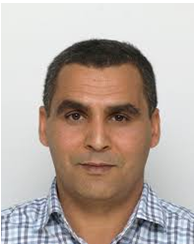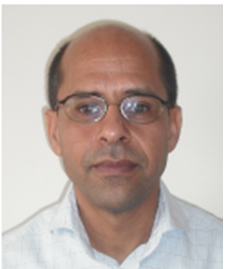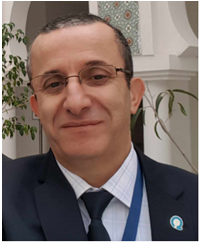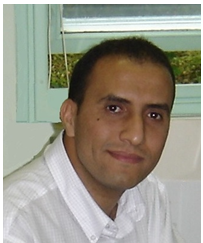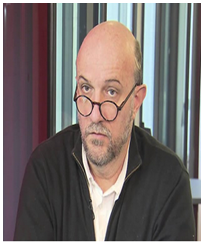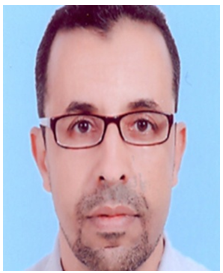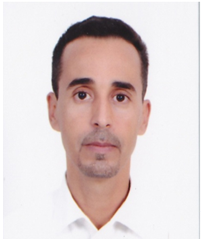
|
|
|
ConférenciersMohamed BAKHOUYA Dr. Mohamed BAKHOUYA is an associate professor at International University of Rabat. He obtained his HDR from UHA-France in 2013 and his PhD from UTBM-France in 2005. He has more than five years experiences in participating and working in sponsored projects. He was PI of Aalto starting grant at Aalto University-Finland (2011-2013), Co-PI (UTBM side) of two European projects ASSET (Advanced Safety and Driver Support in Efficient Road Transport, FP7-SST, 2008-2011, and TELEFOT (Field Operational Tests of Aftermarket and Nomadic Devises in Vehicles, FP7-ICT, 2008-2012. He spent two years as a research scientist in US at George Washington University, HPC laboratory participating and working in sponsored projects, mainly UPC (Unified Parallel C) and NSF Center of High-performance and REConfigurable Computing. He was also a member (UTBM side) of EU EACEA Erasmus Mundus project TARGET I/II (Transfer of Appropriate Requirements for Global Education and Technology), 2011-2015. He is currently a PI of CASANET project (CNRST, 2015-2017), Co-PI of MIGRID (USAID-PEER program, 2017-2019), PI of HELECAR (PSA OpenLAB@Maroc, 2017-2019), Co-PI of SELFSERV (VLIR-UOS, 2016-2018), and Co-PI of AFRIKATATERRE (Solar Dechatlon AFRICA, 2017-2019). He was a reviewer of research project for Agence Nationale de la Recherche, (France, 2011), Ministero dell' Istruzione, dell' Università e della Ricerca (Italy, 2012, 2013, 2016, 2017), and for European Commission-FP7 (2013-2015). He was EiC of IJARAS journal and also serves as a guest editor of a number of international journals, ACM Trans. on Autonomous and Adaptive Systems, Product Development Journal, Concurrency and Computation: Practice and Experience, FGCS, and MICRO. He has published more than 100 papers in international journals, books, and conferences. He has co-authored a book on Geopositioning and Mobility. His research interests include various aspects related to the design and implementation of distributed and complex systems using Big data and CEP techniques.
Said BELKOUCH
Said Belkouch has been a professor at the ENSA-Marrakech since 2003. He completed his Ph.D. in microelectronics at the University of Joseph Fourier-Grenoble in 1989. He then joined the University of Sherbrooke as postdoc and then as research assistant. In 1995, he worked at the National Research Council of Canada (NRC) in Ottawa as a research officer. Subsequently, he joined Tundra Semiconductor corp. (now Integrated Device Technology Inc.) where he worked on the verification and qualification of ASIC IPs. At ENSA-Marrakech, he led an R&D contract on an embedded solution for radars application with Thales Air Systems corp. (Paris) and MASCiR (Rabat). He also received an AUF-PCSI research grant in collaboration with the École Polytechnique de Montréal and INSAT-Tunis in the field of autonomous systems for medical applications. Since 2015, he has been collaborating on the development of an embedded platform for urban mobility management, a project funded by CNRST.
Samir BOUAZIZ
Samir BOUAZIZ received the Ph.D. degree in Electronics, in Paris Sud University, Orsay, France 1992. He is a full Professor at Paris-Sud University. His research focuses on Hardware-software designs of embedded systems for autonomous vehicles and robots. His research is led by time constraints and complexity consideration for a good fit between hardware and algorithms, instrumentation and benchmark systems to understand Human-Vehicle interactions.
Abdelhafid ELOUARDI
Abdelhafid ELOUARDI received the M.S. degrees from Pierre & Marie Curie University, Paris, in 2001 and the Ph.D. degree in Electronics from Paris-Sud University, Orsay, in 2005. He worked at Henri Poincaré University, Nancy, as a researcher in 2005-2006. He is currently an Associate Professor at Paris-Sud University, Orsay, France. In Embedded Systems team of SATIE laboratory, his research interests include Hardware-Software co-design, evaluation and instrumentation of embedded systems, design of smart architectures for image and signal processing, simultaneous localization and mapping applications.
Stéphane ESPIÉ
Stéphane ESPIÉ est responsable de l'équipe SIMU&MOTO, les trois principales thématiques de recherche concernent : - la conception du modèle de trafic multi acteurs (fondé sur une approche informatique multi-agents). - la conception de simulateurs de déplacements - l'instrumentation de véhicules "légers" : moto à ce jour dans le cadre des projets ANR SUMOTORI, DAMOTO, SIMACOM, VIROLO++... Les applications de ses recherches concernent la sécurité routière, et ce pour ses différentes composantes : formation initiale, réglementation, sensibilisation avec des propositions fondées sur des résultats scientifiques.
Rachid LATIF
Rachid LATIF est titulaire d'un diplôme de doctorat en traitement du signal et d’un diplôme d’Habilitation à Diriger les Recherches de la Faculté des Sciences, université Ibn Zohr d’Agadir, obtenus respectivement en 2000 et 2005. En 2001, il a rejoint le Département de Génie Industriel de l’Ecole Nationale des Sciences Appliquées d’Agadir en tant que enseignent chercheur, avant de devenir en 2005 professeur Habilité et en 2015 professeur d'enseignement supérieur (PES) au sein du même département. Actuellement, il est professeur en technologie de l'information au sein du département de Génie Industriel et Electrique de l’École Nationale des Sciences Appliquées, Université Ibn Zohr d’Agadir, Maroc. Ses activités de recherche concernent le domaine des systèmes embarqués et application en agriculture de précision et biomédical. Ses intérêts de recherche incluent le traitement biomédical du signal et de l'image, l'instrumentation biomédicale, la robotique et les systèmes embarqués homogènes (CPU, DSP, FPGA, GPU,…) et hétérogènes (CPU-FPGA et CPU-GPU), l'intelligence artificielle et les technologies de l'information. Il s’intéresse aussi au monitoring en temps réel des prématurés et l'analyse des signaux cardiaques fœtaux. De 2006 à 2014, il a dirigé l’Equipe Signaux Systèmes et Informatique (ESSI) à l’ENSA d’Agadir. Maintenant, il dirige le laboratoire LISTI, qu'il a fondé en décembre 2014, et le Master «Systèmes Embarqués et Ingénierie Biomédicale (SEIB)». Pr. Rachid LATIF est fondateur et membre de la Société Marocaine des Systèmes Embarqués SMSE créée en 2018 à l’ENSA d’Agadir.
Driss YOUSFI
Driss Yousfi received the B.S. and M.S. degrees in Electrical Engineering from Fes University, Morocco and the Ph.D. degree in Electrical Engineering from Oujda University, in 2001. From 1997 to 2001 he was a member of the Electrical Engineering Laboratory at the High National School of Electrical and Mechanical Engineering, Morocco, working on the Modeling and Sensorless Control of Synchronous Motors. Until December 2013, he has been with Marrakech University-ENSA, Morocco as professor at the Electrical Engineering Department and Staff Member of LGECOS Laboratory. He is now Professor at the Department of Electrical Engineering, ENSA Oujda, Mohammed Premier University, Morocco. Between June 2011 and July 2012 he was Research Associate at the University of Malay, Faculty of Engineering, Electrical Engineering Department, Kuala Lumpur – Malaysia. He is also Scientific and Technical Advisor for Altran Maroc-Casablanca and Project Coordinator of PV-EMUL Project with IRESEN (Institut de Recherche en Energie Solaire et Energies Nouvelles), Morocco. Driss Yousfi is a Member of the IEEE Vehicular Technologies, IEEE Industry Applications, IEEE Industrial Electronics, and IEEE Power Electronics Societies. His main research interests include grid connected PV inverter, power converters and motor drives for electric vehicle traction systems and DSP-based systems for real-time control.
|
| Personnes connectées : 12 | Vie privée |

|
